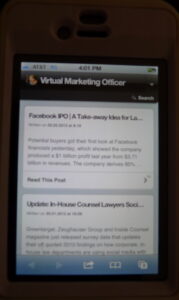 On Monday, September 17, 2012, the Charleston West Virginia Gazette and Daily Mail websites required readers to use Facebook, exclusively, for posting comments on news stories. Facebook? Exclusively? Really? This new Facebook system for online commenting replaces one that had been hosted, I believe though cannot confirm, by the newspaper website. (Charleston West Virginia Gazette and Daily Mail is co-owned by Media News Group and the Chilton Family. )
On Monday, September 17, 2012, the Charleston West Virginia Gazette and Daily Mail websites required readers to use Facebook, exclusively, for posting comments on news stories. Facebook? Exclusively? Really? This new Facebook system for online commenting replaces one that had been hosted, I believe though cannot confirm, by the newspaper website. (Charleston West Virginia Gazette and Daily Mail is co-owned by Media News Group and the Chilton Family. )
 I don’t know about you, but this definitely raised my eyebrows…I’m wondering…
I don’t know about you, but this definitely raised my eyebrows…I’m wondering…
- Are they trying to make it inconvenient to post comments on stories? Anyone who now wants to post a comment on a story, something almost every newspaper allows these days, has to have a Facebook account. Do the people who made this decision own stock in Facebook, looking to upgrade the stock value by pushing new sign-ups?
- Is using Facebook exclusively for reader comments a deal killer? (The name and Facebook photo will appear next to the comment.)
- What sort of reader backlash can they expect?
- Is this a cost saving move to avoid upgrading their own comment system, piggybacking on Facebook’s infrastructure?
- Is this a first mover event that will inspire other newspaper websites to follow? (I didn’t take the time to research it yet)
- Does this move us closer to what I’ve predicted that Facebook will become the new Web—the hub of our lives for social, news, friendship, and business?
It certainly raises some privacy issues for me. Although I never comment anonymously on social media, having my Facebook (profile) photo and name is more personal and social— semi-private, limited to close friends—not something I want to share with the universe of newspaper readers. This alone will deter people like myself, an educated, thoughtful, (somewhat) responsible person from posting a comment on a news story. Do they not understand that?
Here’s how it works.
“Readers who are logged into their Facebook accounts will be presented with a comment box at the bottom of select stories. Upon sharing their thoughts and/or interacting with friends or other readers, their Facebook photo and name will appear next to the comment. [emphasis added]
“Please note that a box underneath the comment field will need to be unchecked if you don’t want your comment to show up on your personal Facebook wall.”
REALLY?
I don’t know about you, but I’ve seen some pretty “funky” Facebook profile photos. Do we really want to see those in the newspaper? Will responsible commenters have to change their profile pics to suit prime time viewing? Or, will those less social media savvy commenters be caught off guard? Don’t we have enough to worry about regarding Facebook privacy?
Are you sitting down? (…the spin will make you dizzy)
Here’s why the newspaper made the change, or so they say:
“Why are we making this change? For a couple of reasons: First, while false Facebook accounts are a legitimate concern, most accounts are registered to the actual user, which means comments are tied to a real person rather than an anonymous screen name. It is our hope that this will raise the level of discourse on our websites.
“Second, this will accelerate the pace of our online comments. Readers’ reactions will appear on a story as soon as they are made. We will moderate the comments after they are posted, and if an offensive comment is made, a moderator in the newsrooms can remove it or even ban a user from ever commenting on the sites again.
“Also, Facebook filters will be in place to weed out vulgar comments. The filters are, at times, a bit overzealous and might misinterpret words or parts of words as unacceptable. If you make a comment and it doesn’t appear, it is awaiting moderation by someone here in our newsrooms.
“Overall, we hope this improves the tone of the comments by providing accountability and makes your visit to our websites a better experience.”
Now, I’m not a regular reader of this newspaper so I’m not familiar with the type of comments they get on their stories, but one can assume that many were pretty low brow as this move is hoping to “raise the level of discourse on our websites.” I do know the Miami Herald (McClatchy) uses Disqus for their commenting system, allowing readers the option of signing in using their Facebook, Twitter, Disqus, or existing MiamiHerald.com username and password. Seems a more balanced approach to me.
Would you use Facebook exclusively for comments on your law blog?
Law firm bloggers often use third party commenting systems on their blogs, most use the built in systems if they’re using WordPress or Blogger platforms, but I’ve seen no one that uses Facebook exclusively for a comment system, and I doubt I ever will. It’s just not practical. I know lawyers, doctors and other professionals that avoid Facebook like the plague. Would you want to block potentially intelligent comments from your blog posts merely because someone did not have a Facebook account? No, of course not. And, I’m going to be watching to see how long this Facebook exclusive system lasts.
What do you think the fall-out of this move will be? Is the Charleston Gazette and Daily Mail blazing a trail? Do you see Facebook becoming the new Web? It certainly notches up the possibility a bit in my mind–and perhaps theirs. Alternately, it could kill comments on the Charleston Daily Mail website, and maybe that’s the intention?
Your thoughts?







Jayne,
The Dallas Morning News went to Facebook commenting quite some time ago. I’m pretty sure they were not the first.
I am a former employee of The News, and in no way do I purport to speak for the company; however, I believe the decision truly was an effort to raise the level of discourse, which had been abysmally bad. “Low brow” would be an understatment; these commenters represented the lowest order of trolls. That said, I have heard anecdotally that the effect was a tremendous drop off in the number of comments, which was disheartening to some of their bloggers, who, for obvious reasons, strive to engage with readers. Another factor to keep in mind is that newspapers simply simply do not have the manpower to monitor the volume of comments they receive.
These are just my observations from having worked in that industry. You definitely raise some good points, especially in regards to professionals’ reluctance to engage via Facebook.
Interesting. Thanks, J for the insight. I thought it odd that although the News has Facebook filters, yet suggest that news staff will be monitoring comments? How does that work? Do the reporters really have the time to monitor stories and comments that are made long after the story was published?
I’m not surprised that comments dropped. Not everyone is a Facebook user and to sign up just to comment is clunky at best. As I pointed out, the McClatchy organization uses Disqus which allows multiple platform login–much more balanced than only Facebook. Further, perhaps the decision makers don’t realize that most times FB users want to comment on news items them just insert a link on a status update that goes into “friends” streams. I would argue that they do not want that comment to appear in the newspaper.
I’ll be keeping my eye on this and thanks again for stopping by! Jayne
Jayne,
What I meant to say is that perhaps news organizations are going to Facebook as a replacement for staff monitoring of comments. I suspect that the reason the trolls get so out of hand on news sites is that their comments go through largely unmonitored aside from profanity filters (unfortunately, there seems as yet to be no filter for poor taste and general nastiness!).
I discovered your blog fairly recently and enjoy reading it. Keep up the good work!
J.
Jane, it’s good to know someone else is thinking about this issue. Both of the major newspapers in our area have gone this way, the Detroit Free Press and the Detroit News. I hate it! I was already a regular commenter on both sites when the newspapers managed comments and had a Facebook account one of my kids had opened for me that I never used. I hate Facebook’s privacy policies, the data mining, etc. Once the newspapers switched over to FB, I locked down the privacy and sharing options as tight as possible and have continued to thoughtfully comment on worthy and important stories. I like the discussion and debates that open up and think for the most part it’s constructive. However, I do know that a couple regular commenters were “flamed” – stalked and harrassed by readers that disagreed with their comments. When one gal stated her opinion about smoking, a man from one of the tobacco states called her house at 2:00 in the morning to yell and scream at her. I sometimes worry that a co-worker or future prospective employer who may disagree with my political views might view some of my comments, which could cause obvious disadvantages.
I would have liked to have been able to comment on a recent article about female bullying in the workplace (“Queen Bees”), to bring up a trend I’ve noticed with my husband employed in the health care field, that men are really getting socked with more than their fair share of bullying by females and how that dynamic works…men haven’t had a lifetime of dealing with these subtle, manipulative behaviors like women have and, because they’re pretty much bewildered (and disenfranchised by the female boss) they give in to every bullying demand made by the fairer sex, resenting and hating their jobs more and more. They fall into that the aphorism of the old marriage joke, if the wife’s not happy, I’m not happy–except this isn’t a mutual commitment based on shared sacrifice, it’s the workplace, where everyone is supposed to be pulling their own weight, for the benefit of the department and, ultimately, the patients. Whew! It sure was nice to get that off my chest here, because I certainly didn’t feel comfortable posting it there with my Facebook account for all the world (i.e., his coworkers) to recognize our last name.